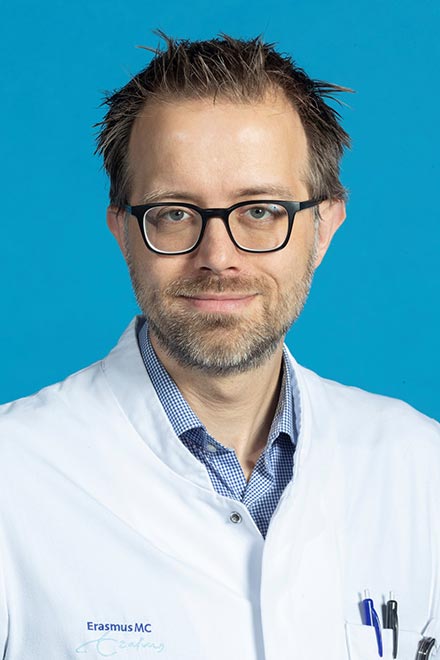Project title: Mapping the gut microbiome in carcinoid syndrome
Hans Hofland, MD, PhD Erasmus MC, University Medical Center Rotterdam

- Status: Completed
- Year(s): 2019
- Grant Type: Pilot
- Research Type: Translational
- Primary Tumor Site: Small intestine
- Article/Video: Click Here
Description
Hofland will research the association between the gut microbiome and symptoms of carcinoid syndrome by mapping the gut microbiome of NET patients with and without carcinoid syndrome and comparing them to healthy individuals.
What question will the researchers try to answer?
What is the interaction of gut bacteria with NET cells and how might this regulatory control affect a tumor’s hormonal secretions that contribute to tumor behavior and hormonal complaints in patients?
Why is this important?
Despite the discovery of links between the microbiome and colorectal and pancreatic cancers, there has been no investigation of this interaction in patients with NETs. Consequently, there is an unmet medical need to improve management options for patients with carcinoid syndrome.
What will researchers do?
Researchers will describe the microbiome in patients with carcinoid syndrome for the first time through DNA analysis of stool samples of 100 patients with metastatic NETs. The microbiome of patients with carcinoid syndrome will be compared to that of patients without carcinoid syndrome and of healthy controls. Finally, the presence of specific bacterial products in feces of patients will be analyzed in order to discover their role in carcinoid syndrome.
How might this improve the treatment of NETs?
By identifying specific bacteria and bacterial products that are associated with patient symptoms within the context of carcinoid syndrome, this project strives to create a novel clinically relevant research area for neuroendocrine tumors.
What is the next step?
Results of this pilot can serve to instigate further research in preclinical models to detect the molecular mechanism of action. Future outcomes could include a clinical trial with targeted disruption of the microbiome-neuroendocrine tumor interaction with the ultimate goal of alleviating carcinoid syndrome symptoms in patients.
Outcomes:
A neuroendocrine tumor (NET) is a rare and unique type of cancer that originates from cells that produce hormones. Hence, patients with these tumors can suffer from syndromes of hormonal overproduction. One of these syndromes is the carcinoid syndrome (CS), a syndrome in which the NET produce too much serotonin which can lead to symptoms of uncontrollable diarrhea and flushing. At present, there is an urgent need to understand why certain NET patients develop this syndrome and why others do not. A better understanding can lead to more types of treatment for these patients. At this time, treatment options are very limited for NET patients. Recent research has shown that bacteria play an important role in the development and treatment resistance of several other types of cancer. Therefore, we investigated the role of gut bacteria, also known as the gut microbiome, in NET patients.
We compared gut bacteria between NET patients with the CS and NET patients without this syndrome. Moreover, we investigated whether NET patients had different gut bacteria compared to their partner that lived in the same household and, therefore, has a comparable dietary intake. Our subjects collected their feces in a special collection tube and sent it to our lab for advanced DNA analysis.
In total, the samples of 87 patients and 95 healthy controls were analyzed. While our main question was whether patients with the CS had certain bacteria that maybe caused this syndrome, we did not find differences in gut bacteria between NET patients with the CS and NET patients who did not have this syndrome. However, we did observe a striking difference between patients and healthy controls. Even though they lived in the same household, NET patients had a lower total amount of bacteria in their gut and less diversity in their gut bacteria. We could even tell whether a fecal sample belonged to a patient or a control based on a group of 17 bacteria. Our findings were confirmed in a separate analysis of the same fecal samples using another technique. Here, we were also able to find differences in molecular signals between NET patients with carcinoid syndrome and those without.
These are important findings because checking whether this group of bacteria is present in subjects with abdominal pain or other NET symptoms might be a first step toward early tumor detection through analysis of a single fecal sample. Moreover, certain bacteria were identified that could play a role in NET development.
More research is needed but these findings are a first step towards a better understanding of why some people develop a NET and other do not. In the future, more treatment options could be developed that target certain bacteria. Currently, we are working on the functions that these bacteria have and how they contribute to tumor development.
In a separate study we investigated whether we could detect biomarkers in blood that could play a role in the carcinoid syndrome. Here, we analyzed blood samples of 96 patients with metastatic small intestinal NET for over 300 circulating factors. This led several potential new candidates that could have a role in the carcinoid syndrome. Further studies are needed to characterize these molecules and their contribution to this disease.
Additional Details
- City: Rotterdam
- Country: Netherlands
- Grant Duration: 1
DISCLAIMER
NETRF funds laboratory research to understand the development of neuroendocrine tumors and translational research to explore new concepts in treatment. Research grant descriptions and research updates from NETRF are not intended to serve as medical advice. It can take years for research discoveries to be fully validated and approved for patient care. Always consult your health care providers about your treatment options.
